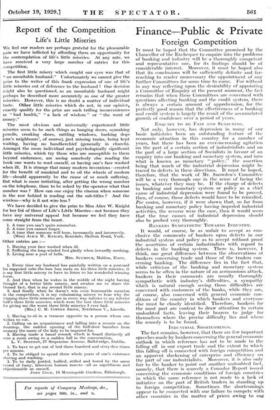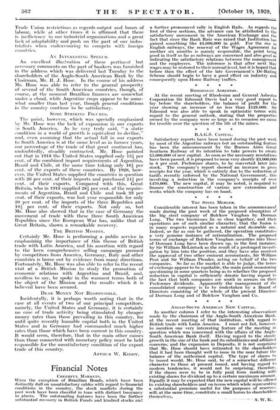Finance—Public & Private
Foreign Competition
IT must be hoped that the Committee promised by the Chancellor of the Exchequer to enquire into the problems of banking and industry will be a thoroughly competent and representative one, for its findings should be of considerable interest. Moreover, it must be hoped also that its conclusions will be sufficiently definite and far- reaching to render unnecessary the appointment of any further Committees for some time to come. Foi Without in any way reflecting upon the desirability of appointing a Committee of Enquiry at the present moment, the fact remains that when these Committees are concerned with questions affecting banking and the credit system, there is always a certain amount of appreherision, for the perfectly good reason that the effectiveness of a banking and credit system is largely the result of the accumulated growth of confidence over a period of years.
ENQUIRY TO BE FAIR AND SEARCHING.
Not only, however, has depression in many of our basic industries been an outstanding feature of the economic situation in this country for a number of years, but there has been an ever-increasing agitation on the part of a certain section of industrialists and on the part of a large section of Socialists in favour of an enquiry into our banking and monetary system, and into what is known as monetary " policy,' the assertion being that much of the industrial depression might be traced to defects in these directions. It must be hoped, therefore, that the work of Mr. Snowden's Committee will be a very thorough one in the sense of facing the issues, whatever they may be. If the charge of defects in banking and monetary system or policy as a chief cause of industrial depression were found to be proved, then, of course, those defects would have to be remedied. Per contra, however, if it were shown that, so far from banking and monetary policy having impeded industrial activities, the reverse were the case, then it would seem that the true causes of industrial depression should also be probed very thoroughly.
BANKERS SYMPATHETIC TOWARDS INDUSTRY.
It. would, of course, be as unfair to accept as con- clusive the comments of bankers upon defects in Our industrial system and policy as to accept without proof the assertions of certain industrialists with regard to defects in the banking system. There is, however, I think, one great difference between the observations of bankers concerning trade and those of the traders con cerning banking. The difference lies in the fact that, while criticism of the banking and monetary system seems to be often in the nature of an acrimonious attack, bankers in their comments are usually thoroughly sympathetic with industry's difficulties, a sympathy which is natural enough seeing those difficulties are concerned with customers of the banks, while they are, of course, also concerned with general economic con- ditions of the country in which bankers and everyone else must be closely identified. Therefore, bankers for the most part are content to draw attention to certain undoubted facts, leaving their hearers to judge for themselves where the precise difficulty lies and where the remedy is to be found.
INDUSTRIAL SHORTCOMINGS.
The fact remains, however, that there are few important speeches made by bankers concerning the general economic outlook in which reference has not to be made to the falling off in our export trade and the extent to which this falling off is connected with foreign competition and an apparent slackening of enterprise and efficiency on the part of our industrialists. Moreover, it is also only fair to the banker to point out another undoubted fact, namely, that there is scarcely a Consular Report issued concerning the economic conditions of foreign countries in which the same reference is not made to a lack of initiative on the part of British traders in standing up to foreign competition. Sometimes the shortcomings appear to he connected with our failure to compete with other countries in the matter of prices owing to out Trade Union restrictions as regards output and hours of labour, while at _other times it is affirmed that there is inefficiency in our industrial organizations and a great lack of adaptability and push on the part of our indus trialists when endeavouring to compete with foreign countries.
AN INTERESTING SPEECH.
An excellent illustration of these pertinent but necessary comments on the part of bankers was furnished in the address which was delivered last Tuesday to the shareholders of the Anglo-South American Bank by the Chairman, Mr. R. J. Hose. In the course of his address Mr. Hose was able to refer to the general prosperity of several of the South American countries, though, of course, at the moment Brazilian finances are somewhat under a cloud, while Argentine crops appear to be some- what smaller than last year, though general conditions in the country continue to be satisfactory.
SOME STRIKING FIGURES.
The point, however, which was specially emphasized by Mr. Hose was the lack of expansion in our exports • to South America. As he very truly said, " a static condition in a world of growth is equivalent to decline," and, even assuming that the actual fall in our exports to South America is at the same level as in former years, our percentage of the trade of that great continent has, undoubtedly, steadily contracted. Mr. Hose pointed out that in 1913 the United States supplied only 151 per cent. of the combined import requirements of Argentina, Brazil and Chile, at the same time taking only 161 per cent. of the exports of these countries. By 1928, how- ever, the United States supplied the countries in question with 26 per cent. of their imports and purchased 241 per cent. of their exports. Compared with this, Great Britain, who in 1913 supplied 281 per cent. of the require- ments of Argentina, Brazil and Chile and took 23 per cent. of their exports, was last year responsible for only 20 per cent. of the imports of the three Republics and 191 per cent. of their exports. Not only so, but Mr. Hose also showed that in the case of Germany the movement of trade with these three South American Republics since the European War has, unlike that of Great Britain, shown a remarkable recovery.
BRITISH MISSION.
Certainly Mr. Hose is performing a public service in emphasizing the importance of this theme of British trade with Latin America, and his assertion with regard to the keen comprehensive selling campaign pursued by competitors from America, Germany, Italy and other countries is borne out by evidence from many directions. Fortunately, Mr. Hose was also able to refer to the recent visit of a British Mission to study the promotion of economic relations with Argentina and Brazil, and, needless to say, he spoke in the warmest terms both of the object of the Mission and the results which it is believed have been secured.
DEAR MONEY NOT RESPONSIBLE.
Incidentally, it is perhaps worth noting that in the case at all events of two of our principal competitors, namely, the United States and Germany, it is certainly no case of trade activity being stimulated by cheaper money rates than those prevailing in this country, for until quite recently loanable capital both in the United States and in Germany had commanded much higher rates than those which have been current in this country. It would seem, therefore, that in the main other causes than those connected with monetary policy must be held responsible for the unsatisfactory condition of the export trade of this country. • ARTHUR W. KIDDY.























































 Previous page
Previous page